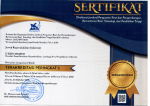Surabaya Menuju Kota Ramah Lansia: Peluang dan Tantangan
Abstract
Increasing number of the elderly globally and nationally has broad implications in family, community and state. WHO issued an age-friendly cities guideline to respond two demographic phenomena, namely aging population and high levels of urbanization. To maintain the quality of health, the elderly need both physical and social environments that consider their characteristics and needs. This facilitates the elderly to access the services, interact with others and actualize themselves optimally. This study aims to analyze the opportunities and challenges faced by Surabaya as one of the ageing population city in Indonesia to be an age-friendly city. Data was collected through quantitative and qualitative approaches. The quantitative approach use several secondary data at the provincial and city levels such as the 2016 Susenas data, 2017 and the 2015 Sakernas. The qualitative approach include interviewing stakeholders, observing, and reviewing literature. This study concludes that Surabaya has an opportunity to be an age-friendly city. This is because Surabaya has local regulation that support fulfillment of elderly need, the existence of elderly institution, and the committed local leader to support the eldery. However, there are still many challenges faced by the Surabaya City, particularly related to inadequate physical facilities, housing, and employment opportunities for the elderly. It requires commitment and support from all elements of the city, public and private sector.Â
Keywords
Full Text:
PDFReferences
Badan Pusat Statistik [BPS].(2016). Profil Penduduk Lansia Provinsi Jawa Timur. Surabaya: Badan Pusat Statistik
Badan Pusat Statistik [BPS]. (2015). Survei Angkatan Kerja Nasional (Sakernas) Tahun 2015. Jakarat: Badan Pusat Statistik
Badan Pusat Statistik [BPS].(2016). Survei Ekonomi Nasional (Susenas) Tahun 2016. Jakarta: Badan Pusat Statistik.
Departemen Kesehatan Republik Indonesia.(2005). Pedoman Pembinaan Kesehatan Usia Lanjut Bagi Petugas Kesehatan II. Jakarta: Departemen Kesehatan Republik Indonesia.
Dinas Kesehatan Jawa Timur.(2015). Profil Kesehatan Kota Surabaya Tahun 2015. Surabaya: Dinas Kesehatan Jawa Timur
Fallen, R &.(2011). Keperawatan Komunitas. Yogyakarta: Nuha Medika.
Hermawati, I. (2015). Kajian Tentang Kota Ramah Lanjut Usia. Yogyakarta: Badan Pendidikan dan Penelitian Kesejahteraan Sosial Balai Besar Penelitian dan Pengembangan Pelayanan Kesejahteraan Sosial. Disampaikan dalam Seminar dan Loka Karya tentang Kota Ramah Lansia di LPPM UNY, Kamis 23 April 2015. Retreived from: http://eprints.uny.ac.id/20570/1/MAKALAH%20KOTA%20RAMAH%20LANJUT%20USIA.UNY.ISTIANA.pdf
Iwarsson, S. (2007). Importance of the Home Environment for Healthy Ageing: Conceptual and Methodological Backgorund of the European ENABLE-AGE Project. The Gerontologist 47 (1), 78-84. crossref
Komda Lansia Provinsi Jawa Timur. 2012. Identifikasi Potensi dan Kesiapan Pra-Lansia di Jawa Timur dalam Memasuki Masa Lanjut Usia. Laporan Kajian. Jawa Timur
Murdiyanto & Gutomo, R.T (2017). Peran Keluarga Dalam Mewujudkan Lanjut Usia Sejahtera. Media Informasi Penelitian Kesejahteraan Sosial. 41 (1), 1-10. crossref
Peraturan Gubernur Jawa Timur No.31 Tahun 2017 tentang Karang Werdha
Peraturan Daerah No.3 tahun 2014 tentang Kesejahteraan Lanjut Usia.
Peraturan Gubernur Jawa Timur No. 6 tahun 2008 tentang Petunjuk Pelaksana Peraturan Daerah Provinsi Jawa Timur Nomor 5 tahun 2007 tentang Kesejahteraan Lanjut Usia.
Peraturan Walikota Surabaya Nomor 15 Tahun 2013 Tentang Pedoman Penyelenggaraan Pemberian Permakanan Bagi Lanjut Usia Sangat Miskin Dan Lanjut Usia Terlantar
Samino.(2002). Proses Menua Menjadi Penyakit?. Makalah Seminar. Disampaikan dalam Peresmian Asosiasi Azheimer Indonesia (AazI) Wilayah Yogyakarta, 12 Oktober 2002.
Suadirman, S.P. (2011). Psikologi Lanjut Usia. Yogyakarta: Gadjah Mada University Press.
SurveyMETER & Center for Ageing Studies University of Indonesia [CAS UI].(2013). Satu Langkah Menuju Impian lanjut Usia: Kota Ramah Lanjut Usia 2030. Kota Surabaya. Yogyakarta: SurveyMETER, Center for Ageing Studies University of Indonesia, The Asian Foundation & AusAid. Retreived from: https://surveymeter.org/read/115/satu-langkah-menuju-impian-lanjut-usia-kota-ramah-lanjut-usia-2030-kota-surabaya
United Nations. (2002). Political Declaration and Madrid International Plan of Action on Ageing. Second World Asembly on Ageing, Madrid, Spain, 8-12 April 2002. New York: United Nations Headquarters.
Vibriyanti, D & Harfina, D. (2017) Determinan Kualitas Hidup Lanjut Usia. Laporan Penelitian. Jakarta. Pusat Penelitian Kependudukan LIPI.
World Health Organization [WHO]. (2007). Global Age-Friendly Cities: A Guide. Switzerlands: WHO Press.
http://www.kompasiana.com/elisakaramoy/mewujudkan-ruang-publik-kota-yang-ramah-lansia_560a2b362d7a617f12ab52e0
http://surveymeter.org/read/409/di-surabaya-kesejahteraan-lanjut-usia-menjadi-tanggungjawab-pemerintah-keluarga-dan-masyarakat
http://suryamalang.tribunnews.com/2016/11/22/ada-44-juta-lansia-di-jatim-ini-program-prioritas-komda-lansia
https://www.jatimtimes.com/baca/176894/20180808/105400/surabaya-masuk-nominasi-kota-ramah-lansia/
DOI: https://doi.org/10.14203/jki.v13i2.321
Copyright (c) 2019 Jurnal Kependudukan Indonesia

This work is licensed under a Creative Commons Attribution-NonCommercial-ShareAlike 4.0 International License.
-----------------------------------------------------------------------------------------------------------------------------
Research Center for Population, Indonesian Institute of Sciences
Widya Graha Building, 7th and 10th floors
Jl. Jenderal Gatot Subroto 10 Jakarta Selatan, Telp (021) 5221687
Website: http:/kependudukan.lipi.go.id;
E-Journal: http://ejurnal.kependudukan.lipi.go.id
Pustaka: http://pustaka.kependudukan.lipi.go.id
-----------------------------------------------------------------------------------------------------------------------------








